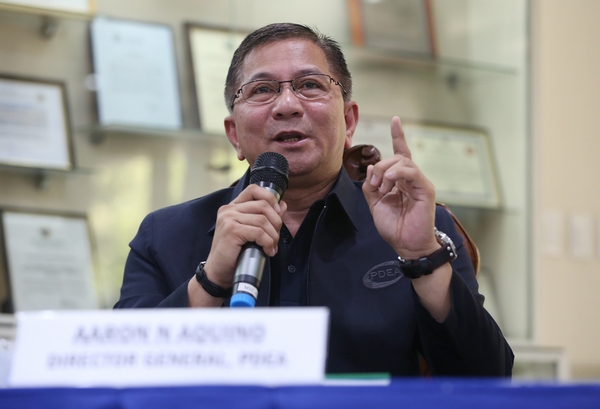
PDEA Dir. Gen. Aaron Aquino during the presscon regarding the Narcolist of Barangay officials at the PDEA Building, Quezon City, Monday./INQUIRER PHOTO
Like ordinary citizens, barangay officials who are on the drugs watchlist of authorities can also be subjected to Oplan Tokhang.
Saying there are no “sacred cows,” Philippine National Police (PNP) chief Director General Oscar Albayalde on Wednesday said they may visit the house of barangay officials who were publicly
identified as having a hand in the illegal drugs trade and encourage them to surrender.
Although nothing is definite at the moment, he said subjecting the alleged barangay narco politicians to Oplan Tokhang is an option.
Oplan Tokhang, a controversial program where police knock on the doors of drug suspects and plead for their surrender, has been credited by the PNP in the surrender of about 1.3 million suspected drug users and pushers in the country.
Cases in the offing
While they are willing to implement any directive from their higher ups in Camp Crame, Supt. Reyman Tolentin, information officer of the
Police Regional Office in Central Visayas (PRO-7), said subjecting narcopoliticians to Oplan Tokhang may be unnecessary for now.
“Perhaps, there is no need to knock and plead for their surrender because cases will definitely be filed against them,” he told Cebu Daily News.
“And if they know that cases will be filed against them, I don’t think they are going to surrender,” he added.
Tolentin said they will nonetheless wait for any order from Camp Crame with regard to the possible implementation of the Oplan Tokhang that will target the alleged barangay narco politicians.
“For now, there’s no directive to that effect so let’s just wait,” he said.
Leia Albiar, spokesperson of the Philippine Drug Enforcement Agency in Central Visayas (PDEA-7), also declined to comment on Albayalde’s declaration sans any written directive.
But she echoed the government’s appeal for those involved in illegal drugs trade, especially those elected by the people, to stop their operations otherwise they will face the consequences of their actions.
“If you are involved in illegal drugs, I urge you to stop,” Albiar said in a phone interview.
She also appealed to those who have knowledge about the narcotics trade to help law enforcers in the investigation in order to arrest drug personalities.
“Do not be afraid to tell us what you know about these illegal drugs operations so we can act on it,” Albiar said.
She said barangay officials who were not named last Monday despite their involvement in the illegal drugs trade could not celebrate yet as they were still validating the involvement of 274 other barangay officials in the drugs trade.
Albiar said the PDEA will reveal the names of another batch of barangay officials who are into illegal drugs before the May 14 barangay and Sangguniang Kabataan elections.
Monitored
She said the validation continues, and in fact, at least 20 persons who are being monitored by PDEA-7 have filed their Certificates of Candidacy at the Commission on Elections.
Albiar, however, didn’t reveal their names.
In a press conference at the PDEA central office in Quezon City last Monday, PDEA Director General Aaron Aquino made public the names of 90 barangay captains and 117 barangay councilors who were allegedly “involved in illegal drug activities.”
Of the number, three were from Cebu: Bibiano Cabaron, Marc Ferdinand Bas and Ramonette Durano.
In the list, Durano was described as a former village chief of Suba and supposedly the public information officer of Danao City in northern Cebu. Bas, on the other hand, was a former barangay captain of Lagtang in Talisay City.
Cabaron, a former village chief of Palanas in Ronda and now a councilor of the same town, said he has not gone out of his house since Monday out of shame or for fear that he might get killed.
The 60-year-old councilor said he has no problem with surrendering to the police if only to clear his name.
“I’m always ready to surrender. But I’m just afraid that law enforcers might create a scenario to pin me down,” Cabaron told Cebu Daily News over the phone.
He said he will submit an affidavit to the PDEA to answer the accusations hurled against him.
“My only request is for authorities to properly validate my inclusion in the drugs list. I guess no proper validation was made because I don’t even have a bad record with our police here,” Cabaron said.
A word of caution
Arvin Odron, director of the Commission on Human Rights in Central Visayas (CHR-7), cautioned the police about subjecting to Oplan Tokhang the barangay officials who are allegedly involved in illegal drugs.
“The CHR has been calling the government, particularly the law enforcement, to always observe the rule of law and respect human rights in all its dealings,” he told Cebu Daily News.
“Subjecting these personalities, whose names were earlier labelled as drug protectors or drug users, to Tokhang is I think a double-angled attack intended to destroy the already damaged dignity of the suspect,” he added.
The rule of law, he said, dictates that suspected drug personalities should be charged before the appropriate forum instead of just exposing them to shame.
“The state has a lot of legal options and remedies available in addressing the issue and the CHR encourages the government, particularly the PNP, to avail of those remedies which do not run counter or hamper the enjoyment of human rights.”
PDEA chief Director General Aaron Aquino had explained that no less than President Rodrigo Duterte ordered the release of the list, which was validated by PDEA, the Philippine National Police, Intelligence Service of the Armed Forces of the Philippines, and the National Intelligence Coordinating Agency.
Aquino, however, said that the validation is merely a confirmation from the agencies that the officials are really involved in illegal drugs. Hence, authorities may need to collate more evidence against those in the list, which is also referred to as the “narcolist.”